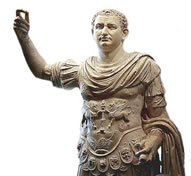Emperor Titus

The phrase by Suetonius "Amor ac deliciae generis humani", love and delight of mankind, expresses what his contemporaries thought to the Emperor Titus and even the judgment that the historians give about him : princeps optimus.
Born in 39 AD, already from his youth lived imperium climate, it was study partner and games of Britannicus , the son of Claudius, and it seems that was with him when him was poisoned and while his friend died, he stayed a long time sick from drinking the same poison.
Not yet twenty year old, he was a military tribune in Germany and Britain, in 60 A.D. he returned to Rome as a quastor, but in 67 he followed his father Vespasian sent by Nero to quell the rebellion of the Jews.
Titus acquired experience during the two years under the guidance of Vespasian and when this was proclaimed emperor and returned to Rome, Titus remained in Judea, was able to finish the war, conquered Jerusalem, the Temple was destroyed and thousands of Jews were enslaved.
On his return to Rome in 71 he was granted the Triumph to that he attended with Vespasian.
During the reign of Vespasian was repeatedly console, the censor and the prefect of the Praetorian Guard.
He was not preceded by good report; was believed greedy because he had supported the harsh fiscal policy of Vespasian - who had found the empty Treasury funds - cruel because he had eliminated the father's opponents, dissolute because conversing until late at night with convivial friends, lustful because he lived with Berenice of Cilicia, the daughter of Herodes Atticus.
Vespasian died in 79 AD and Titus, designated heir, became emperor; Titus denied all of his detractors: away comrades of revelries, sent Berenice in the East, confirmed charges and privileges to senators, he made donations to the people and organized games and refrained from pronouncing death sentences.
Serious events immediately shook his empire, the eruption of Vesuvius and the great fire of 80 that destroyed much of Rome and was immediately followed by the resurgence of an epidemic that decimated the population.
In the face of these events Titus proved to be an attentive governess to the needs of his people; just knew the erection of Vesuvius, Titus sent consular in Campania with food and money for the survivors and ordered to distribute the goodsof those who had died without heirs to the survivors (Suetonius, De Vita Caesarum). Past the danger curatores were commissioned to assess the measures needed because the population could return to live in Pompeii, Herculaneum, Stabiae, Oplontis, but they had to verify that the destruction was such that there was nothing to do and agreed to leave the city. The few survivors were transferred in less damaged areas and made habitable again, but despite the efforts of Titus the region was so destroyed that only at time of Hadrian (120 A.D.) the road system will efficiently ...
Sign up and read the rest of the article!
by M.L. ©ALL RIGHTS RESERVED (Ed 1.0 - 13/10/2016)






